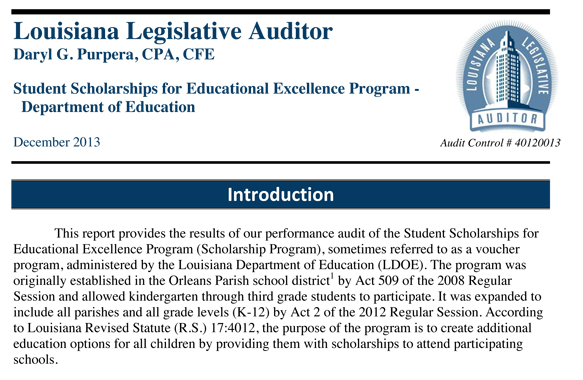By Robert Mann | Originally Published at Something Like Truth. December 16, 2013
Gov. Bobby Jindal’s troubled private-school voucher program took another hit today. This time, it came in the form of highly critical report by the Louisiana Legislative Auditor, who cited numerous accountability deficiencies in the voucher program.
Monday’s audit comes on the heels of a damning report last month, which revealed that at least 45 percent of students in Jindal’s voucher program last year were enrolled in schools that had performance scores rated either D or F.
The Legislative Auditor confirmed some of what I wrote in this blog several months ago: The record keeping at almost every one of these private voucher schools is so poor that auditors could not determine if state funds were being used for educational purposes.
Here’s a summary of the report’s findings (italics indicate direct quotation from the report):
No requirement that private schools accepting vouchers should have a letter grade of “A” or “B”
State law requires public schools that participate in the Scholarship Program to have a letter grade of “A” or “B” indicating the school is academically acceptable by measuring student achievement and student success. However, neither state law nor Bulletin 133 has an equivalent measure to determine if nonpublic schools are academically acceptable.
No criteria to determine if voucher schools have physical and academic capacity
Neither state law nor Bulletin 133 contains formal criteria for determining whether a school requesting to participate in the Scholarship Program has both the academic and physical capacity to serve the number of students it requests. . . . Without formal criteria for evaluating both the academic and physical capacity of a school, LDOE cannot determine whether participating schools can effectively serve the number of Scholarship students they request. Such criteria will become even more important in the future should the program continue to expand.
No definition of “gross or persistent lack of basic academic competence”
According to Bulletin 133 Section 1305 (E)(3), if at any time LDOE determines that a school has “demonstrated gross or persistent lack of basic academic competence,” the school may incur penalties including ineligibility to participate in the Scholarship Program or ineligibility to accept new students. However, Bulletin 133 does not define “gross or persistent lack of basic academic competence” nor does it define the criteria by which to determine when a school should be deemed ineligible to participate in the program or to accept new students. Without specific criteria, LDOE cannot ensure it is holding schools accountable for their academic performance and treating schools consistently.
Schools are overcharging the state
Independent auditors found that 4819 (41%) of the 118 participating schools in academic year 2012-13 either overcharged or undercharged LDOE for tuition payments. Specifically, the independent auditors found the following:
Thirty-five (30%) of the 118 schools overcharged tuition for Scholarship students. The amount overcharged to LDOE for tuition payments ranged from a low of $5 per student to a high of $5,566 per student. According to Bulletin 133,20 tuition and fees for Scholarship students may not be higher than those charged to non-scholarship students. The independent auditors found that these 35 schools charged LDOE more tuition for Scholarship students than non-scholarship students. Independent auditors reported their largest finding at New Living Word School in Lincoln Parish where the school overcharged LDOE $395,520 in tuition through the 3rd quarter, which resulted in LDOE removing the school from the Scholarship Program.
Auditors unable to perform all procedures to determine if funds were used for educational purposes
During their academic year 2012-13 financial reviews, independent auditors were unable to perform all procedures to determine if funds were used for educational purposes for 115 (97%) of the 118 schools because the majority of these schools did not separately account for the Scholarship funds. Other reasons included schools not providing information on their budgets or expenditures, having separate checking accounts but recording revenues only, or not accounting for transactions. Without separate accounting for Scholarship funds, the independent auditors were unable to test whether schools managed $23.9 million (99%) of Scholarship Program funds using adequate accounting controls and whether the expenditures were for educational purposes.
Related articles
- Audit: Poor oversight of Louisiana voucher program (sfgate.com)
- Where is state voucher money actually going? (educationviews.org)












Leave A Comment